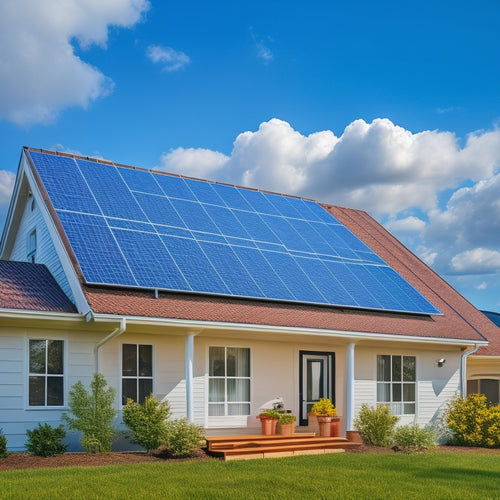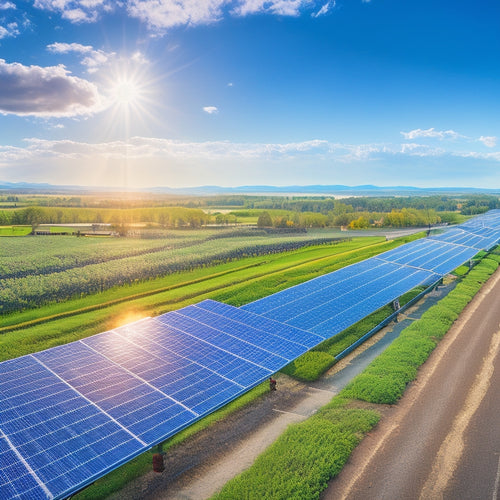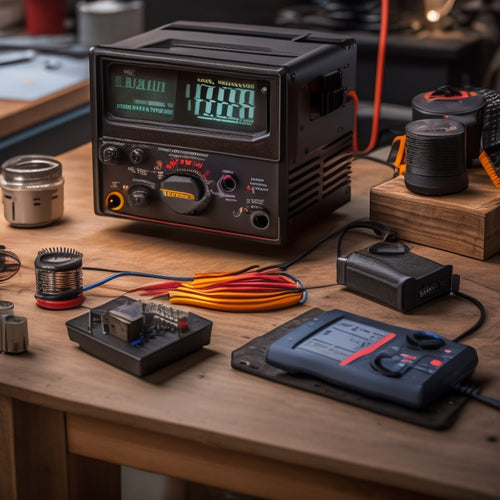
Solar Panel Back up Battery
Share
You're considering a solar panel backup battery to guarantee a reliable energy supply during grid outages. To make an informed decision, you'll want to evaluate energy storage options, considering factors like depth of discharge, round-trip efficiency, and cycle life. Lithium-ion batteries, for instance, provide higher energy density and longer lifetimes compared to lead-acid batteries. Evaluating your daily power requirements will also help you determine the required backup capacity and number of batteries needed. By understanding these key factors, you'll be well on your way to utilizing the full potential of your solar panel system - and there's more to investigate in optimizing your energy independence.
The Essentials
- Integrating solar panels with backup batteries reduces reliance on non-renewable sources and captures sustainable energy for later use.
- High-efficiency batteries with a depth of discharge (DOD) of 80% or higher enhance battery performance and optimize energy use.
- Evaluating cycle life expectancy and maintenance requirements is critical for deep cycle batteries to ensure reliability during outages or emergencies.
- A well-designed energy storage system requires assessing energy usage patterns to determine daily power requirements and peak usage periods.
- Proper maintenance, including regular monitoring and ideal charging, extends the overall cycle life expectancy of solar panel backup batteries.
Renewable Energy Storage Solution
When you're looking for a reliable renewable energy storage solution, you'll want to evaluate your energy storage options.
With the ability to store excess energy generated by your solar panels, you can optimize your energy consumption and reduce reliance on the grid, ultimately giving you greater control over your energy costs Renewable Energy.
You'll need to decide between different types of green power systems, each with its own advantages and limitations.
Energy Storage Options
You're contemplating a solar panel backup battery, but you're aware that it's only as dependable as the energy storage solution supporting it. When it comes to energy storage options, you've got several battery types to choose from, each with its own strengths and weaknesses.
As homeowners seek to maximize their renewable energy with advanced home power backup systems Advanced Home Power Backup Systems, lead-acid batteries are a popular choice due to their affordability, but they're less energy-efficient than their lithium-ion counterparts.
Lithium-ion batteries, on the other hand, offer higher energy density and longer lifetimes, making them a great option for those who want a reliable backup power source. Additionally, with the ability to utilize excess energy and reduce reliance on the grid, energy storage solutions can provide a seamless backup power supply even during outages.
When selecting an energy storage solution, it's crucial to evaluate your specific needs and priorities. If energy efficiency is a top concern, you may want to opt for a lithium-ion battery. However, if budget is a constraint, lead-acid batteries might be a more feasible option.
Additionally, you'll need to take into account factors like depth of discharge, round-trip efficiency, and cycle life to guarantee you're getting the most out of your energy storage solution. By carefully evaluating your options, you can choose an energy storage solution that provides the reliability and freedom you need.
Green Power Systems
Green power systems, also known as renewable energy storage solutions, have emerged as a breakthrough in the field of solar panel backup batteries.
You're now able to utilize the power of solar innovations, enjoying sustainable living without relying on traditional energy sources. These systems store excess energy generated by your solar panels during the day, allowing you to use it at night or during power outages.
With a green power system, you can maximize your solar power by reducing energy waste and gaining protection from grid outages and fluctuations Energy Storage Solutions.
By integrating green power systems with your solar panel backup battery, you'll reduce your carbon footprint and dependence on the grid.
By choosing a green power system, you're not only contributing to a cleaner environment but also gaining energy independence.
You'll enjoy the freedom to live life on your terms, without worrying about power outages or rising energy costs.
Reduced Carbon Footprint Guaranteed
When you opt for a solar panel backup battery, you're not only ensuring a reliable power supply, but you're also greatly reducing your carbon footprint.
By choosing eco-friendly energy storage, you'll be minimizing your reliance on fossil fuels and lowering your greenhouse gas emissions.
Many homeowners are now switching to residential solar panels to power their homes, and with a solar panel backup battery, you can store excess energy generated during the day for use at night or during power outages.
With renewable power solutions, you'll be contributing to a cleaner, more sustainable environment.
Eco-Friendly Energy Storage
By integrating solar panels with a backup battery, homeowners can markedly reduce their reliance on non-renewable energy sources, thereby slashing their carbon footprint.
This eco-friendly energy storage solution enables you to capture sustainable energy from the sun and store it for later use, reducing your dependence on the grid.
A high-efficiency battery is essential in this setup, as it guarantees that the stored energy is employed at its best.
Look for a battery with a high depth of discharge (DOD) and a long cycle life to maximize its performance. A DOD of 80% or higher means you can use most of the stored energy without compromising the battery's lifespan.
When selecting a battery, consider its compatibility with your solar panel system and the overall system design.
You'll want a battery that can handle the charging and discharging cycles seamlessly, guaranteeing a smooth and efficient energy supply.
Renewable Power Solutions
Tap into the full potential of renewable energy with a solar panel backup battery system that assures a reduced carbon footprint. You'll enjoy the benefits of sustainable technology and power independence, whether you're connected to the grid or living off the grid.
With a solar panel backup battery system, you'll experience energy resilience like never before. This system guarantees a reliable supply of electricity, even during power outages or blackouts.
As you invest in renewable energy, you'll reap the benefits of solar incentives and renewable investments. You'll be making eco-conscious choices that not only reduce your carbon footprint but also increase your energy independence.
With advanced battery efficiency, you'll be able to store excess solar energy for later use, reducing your reliance on the grid. By choosing a solar panel backup battery system, you're taking a significant step towards a more sustainable future.
You'll be free from the constraints of traditional energy sources, and you'll be doing your part to reduce the world's carbon footprint.
Deep Cycle Battery Technology
When selecting a deep cycle battery for your solar panel backup system, you'll want to evaluate two critical factors: cycle life expectancy and maintenance requirements.
A battery's cycle life expectancy refers to the number of charge and discharge cycles it can handle before its capacity starts to degrade.
Moreover, understanding the lithium ion battery technology and its benefits in maximizing renewable energy storage can help you make an informed decision.
Additionally, looking into high-performance batteries that can reduce reliance on the grid can also be beneficial.
Cycle Life Expectancy
You invest in a solar panel backup battery to guarantee a reliable power supply during outages or emergencies.
When choosing a deep cycle battery, you need to take into account its cycle life expectancy, which refers to the number of charge and discharge cycles it can handle before its capacity degrades. The cycle life expectancy of a deep cycle battery depends on various factors, including battery chemistry, depth of discharge, and operating conditions.
Typically, a deep cycle battery can last for 300 to 500 cycles, depending on the manufacturer's specifications. However, this number can vary considerably depending on how well you maintain your battery.
For instance, if you consistently deep discharge your battery, its capacity will degrade faster, reducing its overall cycle life expectancy. On the other hand, if you keep your battery charged between 20% and 80% capacity, you can greatly extend its lifespan.
Understanding your battery's cycle life expectancy is essential in ensuring you get the most out of your solar panel backup battery system.
Battery Maintenance Tips
To maximize the cycle life expectancy of your deep cycle battery, proper maintenance is imperative. You'll need to establish a maintenance schedule to guarantee your battery operates at its best.
Start by monitoring your battery's performance regularly, checking voltage, temperature, and charging cycles. Ideal charging is essential, so make certain you're using the correct charger and following the manufacturer's guidelines.
Proper battery care also involves troubleshooting tips, such as identifying and addressing issues like sulfurization, stratification, and overcharging. You should also keep an eye on your battery's lifespan, replacing it when necessary to avoid downtime.
When storing your battery, confirm it's in a well-ventilated area, away from direct sunlight and extreme temperatures.
Safety precautions are crucial, so always wear protective gear when handling your battery, and follow the manufacturer's guidelines for maintenance and repair.
Check Your Energy Demands
You need to assess your energy usage patterns to determine your daily power requirements. This involves calculating the total watt-hours (Wh) of electricity your appliances and devices consume daily.
With a well-designed home energy storage system, you can guarantee a reliable supply of power during outages. Additionally, understanding your energy demands is essential to optimize your renewable energy solutions.
Energy Usage Patterns
Understanding individual energy usage patterns is essential in determining the ideal solar panel backup battery configuration. You need to identify your energy consumption habits to guarantee your backup battery meets your power needs during outages or periods of low solar energy generation.
To do this, monitor your energy usage over a week or a month to identify peak usage periods and overall energy consumption. This will help you determine the required backup capacity and the number of batteries needed.
| Time of Day | Energy Consumption (Wh) |
|---|---|
| Morning (6am-9am) | 1000 |
| Afternoon (12pm-3pm) | 1500 |
| Evening (6pm-9pm) | 2000 |
| Night (9pm-12am) | 500 |
Daily Power Requirements
Your energy usage patterns now serve as a foundation for determining daily power requirements. This calculation is essential in designing a solar panel backup battery system that meets your specific needs.
To accurately determine your daily power requirements, you need to calculate your total energy consumption in watt-hours (Wh) per day. Start by listing all the appliances and devices you want to power with your solar panel backup battery, along with their respective power ratings in watts (W) and usage times in hours.
Next, multiply the power rating of each appliance by its usage time to get the total energy consumption in Wh. Add up the energy consumption of all appliances to get your total daily power requirement.
Effective power management is vital to guarantee your solar panel backup battery can supply power consistently throughout the day. By understanding your daily power requirements, you can size your solar panel array and battery bank correctly, guaranteeing a reliable and efficient energy system that provides you with the freedom and independence you desire.
Longer Cycle Life Guaranteed
You're looking for a solar panel backup battery that can withstand the test of time, and that's where battery life expectancy comes in.
A longer cycle life guarantee guarantees your battery can handle the daily charge and discharge cycles without degrading quickly.
Battery Life Expectancy
The solar panel backup battery's life expectancy is a critical aspect to evaluate, as it directly impacts the overall reliability and cost-effectiveness of the system. You want to ascertain that your battery will last for a long time, providing you with the freedom to enjoy uninterrupted power supply.
When evaluating battery life expectancy, you should consider battery degradation, which is the gradual reduction in a battery's capacity to hold a charge. This degradation occurs due to usage impacts such as depth of discharge, charge cycles, and operating temperatures.
A high-quality solar panel backup battery should have a longer cycle life, which guarantees that it will retain its capacity even after multiple charge and discharge cycles.
Frequently Asked Questions
Can I Use a Solar Panel Backup Battery With an Existing System?
You can integrate a new battery with your existing system, but it's vital to guarantee compatibility between the new battery type and your current setup, considering factors like voltage, capacity, and system integration requirements.
How Long Does It Take to Charge a Solar Backup Battery Fully?
As you wait for the sun to revive your energy reserves, you wonder how long it'll take to fully charge your backup battery. The answer lies in the charging speed and battery capacity - typically, a 5kWh battery takes around 5-7 hours to fully charge with a 1000W solar array.
Is a Solar Panel Backup Battery Suitable for Off-Grid Living?
When you opt for off-grid living, you crave energy independence and sustainable living; a solar panel backup battery can be a suitable choice, allowing you to utilize renewable energy and store it for later use, ensuring a reliable power supply.
Can I Expand My Solar Panel Backup Battery Capacity Later?
When planning your off-grid energy system, you'll likely wonder if you can expand your capacity later. Fortunately, you can upgrade your battery through careful capacity planning, ensuring seamless battery upgrades that adapt to your growing energy needs.
Are Solar Panel Backup Batteries Compatible With All Inverters?
You're maneuvering a complex grid, trying to find the perfect match. When it comes to inverter compatibility, not all batteries are created equal; you'll find that certain types, like lithium-ion, are more versatile and compatible with a wide range of inverters.
Final Thoughts
You've finally made it to the end of this article, and we're not going to sugarcoat it - you need a solar panel backup battery. The alternative is being stuck in the dark, literally. With a renewable energy storage solution, you'll reduce your carbon footprint and impress your eco-warrior friends. Don't bother calculating the ROI, just know that deep cycle battery technology will give you a longer cycle life. So, what are you waiting for? Get your solar panel backup battery and join the 21st century.
Related Posts
-

Cost of Solar Panel Installation
You can expect to pay between $15,000 and $30,000 or more for a typical solar panel installation, depending on the sy...
-

Applications of Photovoltaic Systems
Photovoltaic systems are versatile, converting sunlight into electricity for various applications. You can use them i...
-

Key Features of a DC to AC Converter
A DC to AC converter features high efficiency and conversion rates, which reduce energy costs and improve performance...


